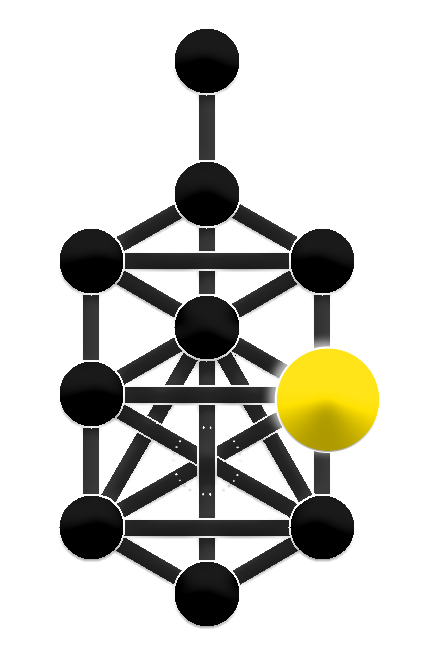Chesed Qlifa | חסד קליפה
In Chesed we have those that come from the excess of mercy and the abuse of authority. Chesed's abundance turns into gluttony and gluttony when we take more than we need, and this applies not only to the material but also to the spiritual. His authority becomes despotism and tyranny. His grace and goodness, when feigned, become hypocrisy. His role of mediator with the spiritual and communication with the divine, when unbalanced, becomes intolerance and fanaticism.
Because the illusion of Chesed is subtle and difficult to detect. It is the illusion of one's own beliefs. We believe, but we do not "know." We think we are in truth (and therefore others in error), that our beliefs are the whole truth, that we have the "exclusive" on God, that it is we who have a private phone line to the Divine. Now, the infinity of God naturally contains things that seem to us even contradictory. And the fact is that every body of belief is something below the abyss (finite, limited) and therefore an illusion in relation to the high. If one aspires to somehow cross that abyss that separates the personal from the cosmic, the human from the divine, it is necessary to tear the veil of illusion inherent in every belief.
Precisely, Chesed's spiritual experience is the vision of love, incompatible with the vices described above. In order to be in tune with the energies of this sphere it is necessary to develop its positive qualities: tolerance, prudence, patience, obedience (to a divine plan), generosity, all related to love. Also humility, virtue and obligation, recognizing that we are a receptacle and act by divine will. All our capacities and authority are derived from Above.
The commandment of Chesed asks us to keep Shabbat: "Remember the Sabbath day (Saturday) to keep it holy.

Chesed, who rules the worlds of form, seeks to assimilate himself to the divine (he is the representative of the divine in the worlds of form), for which he must constantly be looking above it. For this it is necessary to keep an inner space of receptivity to the spiritual, cultivating the aspect of non-being, non-action. To know how to stop everything at a given moment, it is necessary to know how to do and also to know how not to do. To receive God it is necessary to stop identifying totally with our goals and routines of daily life. This is also devotion, because it means that there is nothing that we really put before the Nothingness that is the All.
The commandment could therefore be stated as follows: Being and Nothingness are two faces of the same reality and both are in essence divine, for there is no reality other than Him. During the six days of the week you shall cultivate the "being" aspect, as God did in the formula of Creation. But on Shabbat you will fulfill the internal and external rest (physical and psychic) that is, you will cultivate in you the philosophy of non-action and emptiness in order to see action and fullness in their true perspective.
And this, from the human point of view, is done from Chesed, also the seventh Sephira in ascending order, that is, in the sense of evolution. The six days of striving are the six sefirot from Malkuth to Gevurah, as far as there is work and struggle. The seventh, Chesed, is the divine day of rest, of bringing Malkuth to its primeval position of union in Daat, Knowledge.
In other words, it is the time to bring the world of form to Binah (the eighth day of the Returning Light and the symbol of the World to Come, the day when all will be Shabbat) i.e., it is the time to make the form transparent to its true spiritual condition.
The dark side of Chesed is giving more than one can, giving to show our giving to others, or simply not being merciful to one's fellow man.
Giving beyond our means occurs when we destroy the idea of mercy to ourselves.
We must love ourselves as we love our neighbor. For that reason, it is said that true mercy begins with oneself.
But the Qlifa of Chesed also develops in the absence of mercy, or through hypocrisy and false humility. For example, this can happen when I wish to show my mercy as self-publicity towards others.
We do not have true Chesed when we pretend, as a central goal, to be praised for our actions.
But the positive thing about Chesed is to know that we have the capacity to give and, consequently, to give what we can give. One who has true love has mercy for others and for himself in a balanced way.
